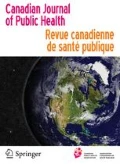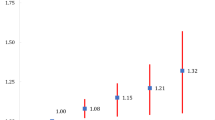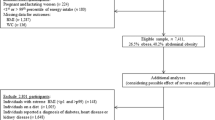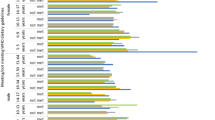Abstract
Objective
To assess the association between consumption of ultra-processed foods and obesity, diabetes, hypertension and heart disease in a nationally representative sample of Canadian adults.
Methods
This study used cross-sectional data from 13,608 adults (aged 19+ years) from the 2015 Canadian Community Health Survey–Nutrition. The survey provided data on food consumption (from 24-h recall) and prevalent obesity (BMI ≥ 30 kg/m2) and self-reported diabetes, hypertension and heart disease. All foods and drinks consumed were classified according to the extent and purpose of industrial processing using the NOVA classification. Ultra-processed food consumption was estimated as proportion of total daily energy intake. Multivariable logistic regression models assessed the association between ultra-processed food consumption and obesity, diabetes, hypertension and heart disease, adjusting for a range of socio-demographic and lifestyle factors.
Results
In 2015, ultra-processed food contributed, on average, to 24% of total daily energy intake in the lowest tertile of ultra-processed food consumption and 73% in the highest tertile. Compared with those in the lowest tertile, adults in the highest tertile of ultra-processed food consumption had 31% higher odds of obesity (OR = 1.31, 95% CI: 1.06–1.60), 37% higher odds of diabetes (OR = 1.37, 95% CI: 1.01–1.85) and 60% higher odds of hypertension (OR = 1.60, 95% CI: 1.26–2.03), adjusting for a range of covariates.
Conclusion
Higher consumption of ultra-processed foods is associated with higher prevalence of obesity, diabetes and hypertension among Canadian adults. A comprehensive set of strategies and policies is needed to discourage consumption of ultra-processed foods in Canada and to make unprocessed or minimally processed foods more affordable, available and appealing.
Résumé
Objectif
Évaluer l’association entre la consommation d’aliments ultra-transformés et l’obésité, le diabète, l’hypertension et les maladies cardiaques dans un échantillon nationalement représentatif d’adultes canadiens.
Méthodes
Cette étude a utilisé des données transversales provenant de 13 608 participants adultes (âgés de 19+ ans) dans le cadre de l’Enquête sur la santé dans les collectivités canadiennes 2015–nutrition. L’enquête a fourni des données sur la consommation alimentaire (rappel de 24h) et la prévalence de l’obésité mesurée (IMC ≥ 30 kg/m2), et le diabète, l’hypertension et les maladies cardiaques auto-rapportés. Tous les aliments et boissons consommés ont été classés selon la classification NOVA. La consommation d’aliments ultra-transformés a été estimée en utilisant l’apport énergétique relatif des aliments ultra-transformés. Des modèles de régression logistique multiple ont été utilisés pour vérifier l’association entre la consommation d’aliments ultra-transformés et l’obésité, le diabète, l’hypertension et les maladies cardiaques, en ajustant pour plusieurs facteurs sociodémographiques et comportementaux.
Résultats
En 2015, les aliments ultra-transformés ont contribué, en moyenne, à 24 % de l’apport énergétique quotidien total dans le tertile le plus bas de la consommation d’aliments ultra-transformés et 73 % dans le tertile le plus élevé. Comparativement au premier tertile, les adultes du tertile supérieur de la consommation d’aliments ultra-transformés avaient de chance 31 % plus élevée d’avoir l’obésité (RC = 1,31, IC 95% : 1,06-1,60), 37 % plus élevée d’avoir le diabète (RC = 1,37, IC 95% : 1,01-1,85), et 60 % plus élevée d’avoir l’hypertension (RC = 1,60, IC 95% : 1,26-2,03), en ajustant pour une gamme de variables.
Conclusion
Une consommation plus élevée d’aliments ultra-transformés est associée à une prévalence plus élevée d’obésité, de diabète et d’hypertension chez les adultes canadiens. Des stratégies et des politiques sont nécessaires pour décourager la consommation d’aliments ultra-transformés au Canada, ainsi que des stratégies qui rendent les aliments non transformés ou peu transformés plus abordables, disponibles et attrayants.
Similar content being viewed by others
References
Branca, F., Lartey, A., Oenema, S., Aguayo, V., Stordalen, G. A., Richardson, R., Arvelo, M., & Afshin, A. (2019). Transforming the food system to fight non-communicable diseases. BMJ, 364, l296. https://doi.org/10.1136/bmj.l296.
Diabetes Canada. (2019). Diabetes in Canada. Prevalence and costs. https://www.diabetes.ca/getmedia/a13c0439-fae8-488d-a90b-7a28f1899386/2019-Backgrounder-Canada.pdf.aspx
Garriguet, D. (2008). Impact of identifying plausible respondents on the under-reporting of energy intake in the Canadian Community Health Survey. Health Reports, 19(4), 47–55.
Gorber, S. C., Shields, M., Tremblay, M. S., & McDowell, I. (2008). The feasibility of establishing correction factors to adjust self-reported estimates of obesity. Health Reports, 19(3), 71–82.
Hall, K. D., Ayuketah, A., Bernstein, S., Brychta, R., Cai, H., Cassimatis, T., Chen, K. Y., Chung, S. T., Costa, E., Courville, A., Darcey, V., Fletcher, L. A., Forde, C. G., Gharib, A. M., Guo, J., Howard, R., Joseph, P. V., McGehee, S., Ouwerkerk, R., … Zhou, M. (2019). Ultra-processed diets cause excess calorie intake and weight gain: a one-month inpatient randomized controlled trial of ad libitum food intake. NutriXiv. https://doi.org/10.31232/osf.io/w3zh2.
Health Canada. (2017). Reference guide to understanding and using the data: 2015 Canadian Community Health Survey-Nutrition. http://www.deslibris.ca/ID/10093153
Health Canada. (2019). Canada’s food guide. https://food-guide.canada.ca/
Institute for Health Metrics and Evaluation. (2018). Canada profile. http://www.healthdata.org/canada
Juul, F., Steele, E. M., Parekh, N., Monteiro, C. A., & Chang, V. W. (2018). Ultra-processed food consumption and excess weight among US adults. The British Journal of Nutrition, 120(1), 90–100. https://doi.org/10.1017/S0007114518001046.
Kirkpatrick, S. I., Baranowski, T., Subar, A. F., Tooze, J. A., & Frongillo, E. A. (2019). Best practices for conducting and interpreting studies to validate self-report dietary assessment methods. Journal of the Academy of Nutrition and Dietetics, 119(11), 1801–1816. https://doi.org/10.1016/j.jand.2019.06.010.
Lajous, M., Bijon, A., Fagherazzi, G., Rossignol, E., Boutron-Ruault, M.-C., & Clavel-Chapelon, F. (2014). Processed and unprocessed red meat consumption and hypertension in women. The American Journal of Clinical Nutrition, 100(3), 948–952. https://doi.org/10.3945/ajcn.113.080598.
Lawrence, M. A., & Baker, P. I. (2019). Ultra-processed food and adverse health outcomes. BMJ, 365. https://doi.org/10.1136/bmj.l2289.
Louzada, M. L. d. C., Baraldi, L. G., Steele, E. M., Martins, A. P. B., Canella, D. S., Moubarac, J.-C., Levy, R. B., Cannon, G., Afshin, A., Imamura, F., Mozaffarian, D., & Monteiro, C. A. (2015). Consumption of ultra-processed foods and obesity in Brazilian adolescents and adults. Preventive Medicine, 81, 9–15. https://doi.org/10.1016/j.ypmed.2015.07.018.
Mendonça, R. de D., Pimenta, A. M., Gea, A., de la Fuente-Arrillaga, C., Martinez-Gonzalez, M. A., Lopes, A. C. S., & Bes-Rastrollo, M. (2016a). Ultraprocessed food consumption and risk of overweight and obesity: the University of Navarra Follow-Up (SUN) cohort study. The American Journal of Clinical Nutrition. https://doi.org/10.3945/ajcn.116.135004
Mendonça, R., de D., Lopes, A. C. S., Pimenta, A. M., Gea, A., Martinez-Gonzalez, M. A., & Bes-Rastrollo, M. (2016b). Ultra-processed food consumption and the incidence of hypertension in a Mediterranean cohort: the Seguimiento Universidad de Navarra Project. American Journal of Hypertension. https://doi.org/10.1093/ajh/hpw137.
Monteiro, C. A., Cannon, G., Moubarac, J.-C., Levy, R. B., da Louzada, M. L., C., & Jaime, P. C. (2017). The UN Decade of Nutrition, the NOVA food classification and the trouble with ultra-processing. Public Health Nutrition, 1–13. https://doi.org/10.1017/S1368980017000234.
Monteiro, C. A., Cannon, G., Lawrence, M., Louzada, M. L. da C, & Machado, P. P. (2019). Ultra-processed foods, diet quality, and health using the NOVA classification system. FAO.
Moubarac, J.-C., Batal, M., Martins, A. P. B., Claro, R., Levy, R. B., Cannon, G., & Monteiro, C. A. (2014). Processed and ultra-processed food products: consumption trends in Canada from 1938 to 2011. Canadian Journal of Dietetic Practice and Research 75(1), 15–21. https://doi.org/10.3148/75.1.2014.15.
Moubarac, J.-C., Batal, M., da Louzada, M. L., C., Steele, E. M., & Monteiro, C. A. (2017). Consumption of ultra-processed foods predicts diet quality in Canada. Appetite, 108, 512–520. https://doi.org/10.1016/j.appet.2016.11.006.
Nardocci, M., Leclerc, B.-S., da Louzada, M. L., C., Monteiro, C. A., Batal, M., & Moubarac, J.-C. (2019). Consumption of ultra-processed foods and obesity in Canada. Canadian Journal of Public Health 110(1), 4–14.
PAHO. (2015). Ultra-processed food and drink products in Latin America: trends, impact on obesity, policy implications. Pan American Health Organization. http://www.paho.org/hq/index.php?option=com_content&view=article&id=11153%3Aultra-processed-food-and-drink-products&catid=4999%3Adocuments&Itemid=0&lang=en
Public Health Agency of Canada. (2017a). Diabetes in Canada: highlights from the Canadian Chronic Disease Surveillance System. Public Health Agency of Canada. http://publications.gc.ca/collections/collection_2018/aspc-phac/HP35-94-2017-eng.pdf
Public Health Agency of Canada. (2017b). Canadian chronic disease indicators, Quick Stats, 2017 Edition. Canadian Chronic Disease Indicators, Quick Stats, 2017 Edition., 37(8), 248–251.
Srour, B., Fezeu, L. K., Kesse-Guyot, E., Allès, B., Chazelas, E., Deschasaux, M., Hercberg, S., Monteiro, C. A., Julia, C., & Touvier, M. (2019a). Ultra-processed food intake and risk of type 2 diabetes in a French cohort of middle-aged adults. European Journal of Public Health, 29(Supplement_4). https://doi.org/10.1093/eurpub/ckz185.388.
Srour, B., Fezeu, L. K., Kesse-Guyot, E., Allès, B., Méjean, C., Andrianasolo, R. M., Chazelas, E., Deschasaux, M., Hercberg, S., Galan, P., Monteiro, C. A., Julia, C., & Touvier, M. (2019b). Ultra-processed food intake and risk of cardiovascular disease: prospective cohort study (NutriNet-Santé). BMJ, 365. https://doi.org/10.1136/bmj.l1451.
Statistics Canada. (2017). 2015 Canadian Community Health Survey (CCHS) – nutrition. User: Guide.
Swinburn, B. A., Kraak, V. I., Allender, S., Atkins, V. J., Baker, P. I., Bogard, J. R., Brinsden, H., Calvillo, A., Schutter, O. D., Devarajan, R., Ezzati, M., Friel, S., Goenka, S., Hammond, R. A., Hastings, G., Hawkes, C., Herrero, M., Hovmand, P. S., Howden, M., … Dietz, W. H. (2019). The global syndemic of obesity, undernutrition, and climate change: The Lancet Commission report. Lancet, 0(0). https://doi.org/10.1016/S0140-6736(18)32822-8.
Thompson, F. E., Kirkpatrick, S. I., Krebs-Smith, S. M., Reedy, J., Schap, T. E., Subar, A. F., & Wilson, M. M. (2015). The National Cancer Institute’s Dietary Assessment Primer: a resource for diet research. Journal of the Academy of Nutrition and Dietetics, 115(12), 1986–1995. https://doi.org/10.1016/j.jand.2015.08.016.
Vandevijvere, S., Jaacks, L. M., Monteiro, C. A., Moubarac, J.-C., Girling-Butcher, M., Lee, A. C., Pan, A., Bentham, J., & Swinburn, B. (2019). Global trends in ultraprocessed food and drink product sales and their association with adult body mass index trajectories. Obesity Reviews : An Official Journal of the International Association for the Study of Obesity, 20(Suppl 2), 10–19. https://doi.org/10.1111/obr.12860.
Xi, B., Huang, Y., Reilly, K. H., Li, S., Zheng, R., Barrio-Lopez, M. T., Martinez-Gonzalez, M. A., & Zhou, D. (2015). Sugar-sweetened beverages and risk of hypertension and CVD: a dose-response meta-analysis. The British Journal of Nutrition, 113(5), 709–717. https://doi.org/10.1017/S0007114514004383.
Zhang, Z., Jackson, S. L., Martinez, E., Gillespie, C., & Yang, Q. (2020). Association between ultraprocessed food intake and cardiovascular health in US adults: A cross-sectional analysis of the NHANES 2011–2016. The American Journal of Clinical Nutrition. https://doi.org/10.1093/ajcn/nqaa276
Funding
This study was funded by the Heart and Stroke Foundation of Canada.
Author information
Authors and Affiliations
Contributions
All authors contributed to the study conception and design. Material preparation and analysis were performed by Milena Nardocci, Jane Y. Polsky and Jean-Claude Moubarac. The first draft of the manuscript was written by Milena Nardocci and all authors commented on previous versions of the manuscript. All authors read and approved the final manuscript.
Corresponding author
Ethics declarations
Conflict of interest
The authors declare that they have no conflict of interest.
Additional information
Publisher’s note
Springer Nature remains neutral with regard to jurisdictional claims in published maps and institutional affiliations.
Electronic supplementary material
ESM 1
(DOCX 28 kb)
Rights and permissions
About this article
Cite this article
Nardocci, M., Polsky, J.Y. & Moubarac, JC. Consumption of ultra-processed foods is associated with obesity, diabetes and hypertension in Canadian adults. Can J Public Health 112, 421–429 (2021). https://doi.org/10.17269/s41997-020-00429-9
Received:
Accepted:
Published:
Issue Date:
DOI: https://doi.org/10.17269/s41997-020-00429-9




